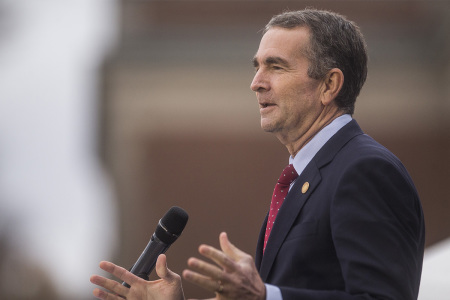Virginia faith leaders urge Gov. Northam not to enforce new law requiring them to 'violate' religious convictions

Forty Virginia faith leaders have signed onto a letter urging Gov. Ralph Northam and state legislators not to enforce a new law that would require residents to violate their religious convictions.
Enacted in July, the "Virginia Values Act" requires churches, and religious ministries and schools to hire employees who do not share the same views regarding sexuality, marriage, and gender identity. Violators will face fines up to $100,000.
Similarly, another bill that also became law on July 1, requires churches and religious businesses to include in their health care plans coverage for elective body-altering gender surgeries and bans them from offering sports, parenting classes, and Christian discipleship should they be based on the belief that biological sex is an immutable trait.
government punishment — regardless of whether those beliefs are religious. Our government should protect, not threaten, this freedom," the open letter from the faith leaders reads.
"Each one of us operates as an organization with core beliefs that knit our staff and volunteers together. These same convictions drive us to serve our communities with a particular mission. We are proud to live by the words of Section 16 of the Virginia Constitution's Declaration of Rights, which declares: 'it is the mutual duty of all to practice Christian forbearance, love, and charity toward each other.'”
State law, they said, should not interfere with their core mission nor target groups with hostility. If Virginia forces them to choose, they will have no option but to close, the faith leaders added.
Their letter comes months after Calvary Road Baptist Church, Community Fellowship Church, Community Christian Academy, and Care Net, challenged the Virginia Values Act in a suit filed earlier this year. The case, Calvary Road Baptist Church v. Herring, alleges that the law is a violation of their freedoms to live out their religious convictions.
“Our clients offer spiritual guidance, education, pregnancy support, and athletic opportunities to their communities because of the religious values that motivate them,” said Denise Harle, an attorney with the Alliance Defending Freedom who is representing the Virginia churches and ministries, in a statement shared with The Christian Post.
“But Virginia’s new law forces these ministries to abandon their convictions or pay crippling fines. Such government hostility has no place in a free society. Virginia ministries are committed to their faith, and they are asking that the state allow them to live and work according to their beliefs, as other Virginians are permitted to do.”
Filed in late September in the Virginia Circuit Court for the county of Loudoun, the complaint states that the Virginia Values Act violates the Virginia Religious Freedom Restoration Act and a number of provisions of the state constitution, including free exercise, free speech, freedom of association, the establishment clause, and due process rights.
In concert with the state case, ADF attorneys also filed a federal suit in the U.S. District Court for the Eastern District of Virginia in Updegrove v. Herring, in defense of wedding photographer Bob Updegrove.
The state law now forbids the Virginia photographer from publicly explaining on his studio's website why he only celebrates wedding ceremonies between a man and a woman. Such communications are now considered legally discriminatory on the basis of sexual orientation.
“Every American, including artists, should be free to peacefully live and work according to their faith without fear of unjust punishment,” said ADF Senior Counsel Jonathan Scruggs, in a statement back in September.
Scruggs is the director of the ADF Center for Conscience Initiatives.
“Because of Virginia’s new law, photographers like Bob face an impossible choice: violate the law and risk bankruptcy, promote views against their faith, or close down. The government cannot demand that artists create content that violates their deepest convictions.”
In June, the U.S. Supreme Court ruled in a landmark case, Bostock v. Clayton County, that it was unconstitutional to fire someone on the basis of sexual orientation and "transgender status." Doing so is a form of sex discrimination that is prohibited under Title VII of the Civil Rights Act of 1964, the high court ruled.



















